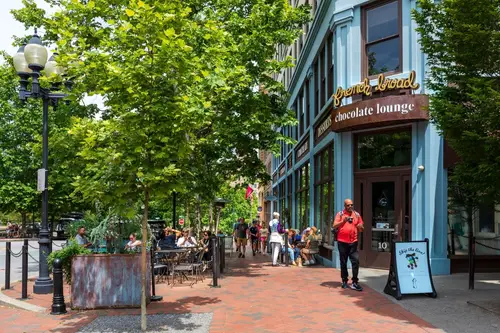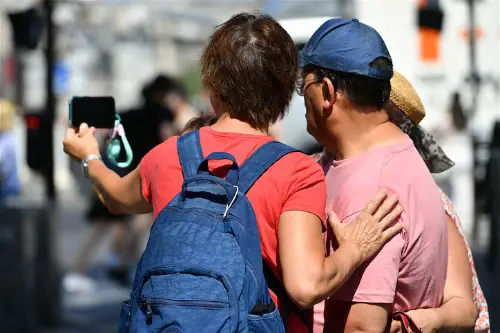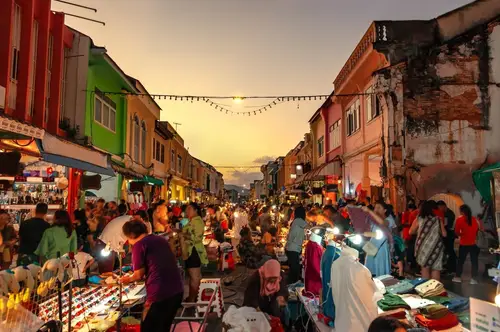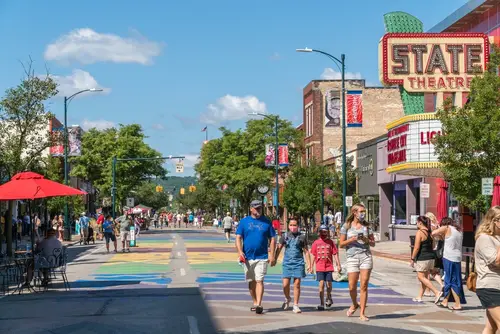1. Talking loudly in quiet places

Many travelers forget that their “indoor voice” is universal. In many cultures, speaking too loudly in restaurants, temples, or public transport is seen as inconsiderate. Locals may not confront you directly, but they definitely notice. It can feel like tourists are disturbing the shared space rather than participating in it.
Noise levels can carry a different meaning depending on the country. For example, in Japan or Switzerland, a hushed tone is expected in trains, while in Southern Europe, lively conversation is more acceptable. Knowing the local expectation helps you blend in. Ignoring it makes you stand out in a way that annoys residents.
2. Ignoring dress codes

Clothing can be a subtle but powerful sign of respect. In some regions, especially near religious or sacred sites, locals expect modest attire. Tourists in beachwear wandering into churches or shrines often spark silent disapproval. It communicates that you didn’t bother to learn or care about local customs.
This isn’t about fashion policing—it’s about context. A tank top is fine at the seaside, but it looks careless in a cathedral. In countries with stricter cultural norms, disregarding dress codes can even come off as insulting. Respectful clothing choices show awareness and sensitivity.
3. Blocking sidewalks for photos

We all love a good snapshot, but standing in the middle of a busy street to capture the perfect shot irritates locals quickly. People trying to get to work or run errands can’t navigate easily when tourists freeze the flow of movement. It might not seem like a big deal, but it’s disruptive. Over time, it breeds resentment toward visitors.
Sidewalks and plazas are functional spaces before they’re backdrops. Locals don’t get the luxury of treating them like photo sets. When travelers clog walkways for selfies, it signals that daily life is less important than your vacation. A quick step aside can make all the difference.
4. Disrespecting queues

Lines are a big deal in many cultures. Tourists who cut in, cluster around the entrance, or ignore the order frustrate locals who value fairness. Even if you don’t mean harm, it sends the message that you think your time is more important. That lack of patience feels rude to everyone waiting.
Queue etiquette varies by place, but pushing ahead almost never goes over well. In the UK, for instance, jumping the line is practically a cultural offense. In Asia, some places may tolerate looser structures, but barging ahead is still frowned upon. Observing the flow shows respect for unspoken rules.
5. Mishandling local greetings

Greetings are small gestures, but they carry weight. Ignoring or botching them can make locals feel dismissed. For example, failing to return a “bonjour” in France can set a chilly tone instantly. It may seem minor, but it reads as arrogance or disinterest.
Learning basic greetings in the local language can warm interactions. Even a simple hello or thank you goes further than silence. Tourists who don’t try come across as detached. A little effort is a sign of cultural appreciation.
6. Leaving trash behind

Littering is one of the most visible ways tourists leave a negative mark. It shows disregard for both the environment and the people who live there. Locals often see their favorite spots spoiled by careless visitors. It can sour how communities feel about tourism altogether.
Some cities and natural sites already struggle with waste management. When travelers add to the problem, it feels like dumping responsibility on residents. Carrying your trash until you find a bin is a small effort. It proves that you care about the place you’re visiting.
7. Over-tipping or under-tipping

Money habits can make locals uncomfortable, even when intentions are good. In places where tipping is expected, skipping it feels disrespectful. On the flip side, tipping too generously in countries where it’s not customary can create awkwardness. Locals may even feel patronized.
Tipping etiquette varies widely. In the US, it’s part of service workers’ income; in Japan, it can actually be insulting. Researching the standard before arriving avoids missteps. It shows that you’re tuned in to how daily life works.
8. Feeding wildlife

Giving food to local animals might feel kind, but it often harms ecosystems. Birds, monkeys, or fish can become dependent on human snacks, disrupting their natural behavior. Worse, they may become aggressive toward people. Locals who deal with this daily often get frustrated with well-meaning tourists.
Wildlife authorities in many destinations explicitly ask visitors not to feed animals. It protects both the species and the environment. Tourists ignoring these requests suggest they know better than experts. Respecting boundaries helps preserve the natural balance for everyone.
9. Over-negotiating prices

Haggling is part of the fun in many markets, but there’s a line between bargaining and badgering. Tourists who push too hard for a discount can make sellers feel disrespected. A few extra cents may mean little to you but a lot to a vendor. Driving the price down aggressively can leave a sour impression.
Locals often expect some back-and-forth, but they also expect fairness. Knowing when to stop shows cultural sensitivity. A balanced negotiation feels like a shared game, not exploitation. Crossing the line turns travel charm into tension.
10. Taking photos of people without asking

Pointing a camera at someone without consent can feel invasive. While some cultures are more relaxed, in many places it’s considered rude or even offensive. Imagine being treated like a curiosity in your own neighborhood. That’s how locals often feel when tourists snap without asking.
Asking permission is both polite and respectful. Many people will happily say yes if you take a moment to connect first. Some may refuse, and that’s their right. Respecting their wishes prevents a one-sided interaction.
11. Not learning basic local words

Skipping the effort to learn even a few phrases can make you seem detached. Locals often notice when tourists don’t bother with “please,” “thank you,” or “excuse me.” It suggests a lack of interest in the culture. Even poor pronunciation is usually welcomed over silence.
Language attempts create small bridges. They show that you’re participating, not just passing through. It doesn’t take much time but can change the tone of an interaction. Locals appreciate the humility behind trying.
12. Expecting everything to be like home

Travel is about experiencing difference, but some tourists complain when things don’t match their comfort zone. Whether it’s food, service speed, or public transport quirks, expecting home standards misses the point. Locals notice when visitors grumble about local ways. It can feel dismissive of their culture.
Adaptability is key to enjoying travel. Things won’t always be familiar, and that’s part of the adventure. Embracing local rhythm shows openness. Resisting it comes across as entitlement.
13. Ignoring traffic rules

Crossing the street carelessly or ignoring local traffic systems frustrates drivers and pedestrians alike. In busy cities, jaywalking tourists can slow everyone down. It also puts you in danger. Locals often roll their eyes at visitors who treat streets like playgrounds.
Traffic norms differ, but safety rules exist for a reason. In some places, strict pedestrian discipline keeps chaos in check. When tourists ignore that, it makes them stand out for the wrong reasons. Following local flow shows respect and self-awareness.
This post 13 Travel Habits That Make Locals Silent but Furious was first published on Greenhouse Black.
